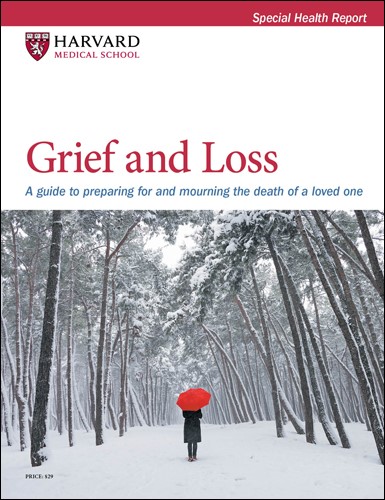Getting stuck in long-term grief
Prolonged grief disorder is now a recognized mental health condition.
- Reviewed by Anthony L. Komaroff, MD, Editor in Chief, Harvard Health Letter; Editorial Advisory Board Member, Harvard Health Publishing

When a loved one passes away, we each grieve differently and on our own timeline. When an intense level of grief lasts beyond a year, however, experts now have an official diagnosis for it. In March 2022, the American Psychiatric Association added "prolonged grief disorder" to its Diagnostic and Statistical Manual of Mental Disorders, Fifth Edition (DSM-5) — the guide clinicians use to diagnose mental health conditions.
"Prolonged grief isn't just missing your loved one at 12 months. It's debilitating and interferes with functioning. It exceeds social, cultural, and religious norms," says Sue Morris, a senior psychologist who specializes in bereavement at Harvard-affiliated Dana-Farber Cancer Institute.
Prevalence and symptoms
Prolonged grief disorder applies only to people mourning the death of a loved one. The condition is estimated to affect 7% to 10% of bereaved adults.
Symptoms are very specific. After 12 months, a person with prolonged grief still has a daily, intense longing or yearning for the loved one or remains preoccupied with thoughts and memories of the loved one to the point that it interferes with daily life.
To be diagnosed with prolonged grief, a person must also have at least three of the following symptoms:
- a feeling that part of oneself has died
- disbelief about the death
- avoidance of reminders that the person is gone
- intense anger, bitterness, or sorrow related to the death
- difficulty re-engaging with life
- emotional numbness, especially regarding connection with others
- a feeling that life is now meaningless
- intense loneliness due to the death.
In addition, the symptoms must not be better explained by other conditions, such as depression, post-traumatic stress disorder, or substance abuse.
Living in grief
There are a number of reasons why the cloud of grief can envelop us and keep us wandering aimlessly in another world. The risk factors fall into two categories:
- circumstances related to the death, including trauma, suddenness, or violence; lack of preparation for the death; death of a child or a younger person; or death in a hospital intensive care unit
- circumstances related to the bereaved individual, including a history of psychological disorders, such as depression or substance use; other losses in life; or lack of social support.
Having a close or dependent relationship with the person who died is another risk factor for prolonged grief disorder, especially for people who've been married for many years. "They grew up with their spouse and often relied on each other for companionship and doing certain jobs. When one dies, the other has to navigate a lot of change, and that can be very hard, especially if they are isolated or struggling with other issues," Morris says.
Those risk factors can derail the normal grieving process. "That's why prevention is important. We want to get ahead of that curve. When I meet family members soon after someone dies, I try to identify known risk factors and what we can do now to help," she says.
Health consequences
Left untreated, prolonged grief disorder can lead to health problems. Any kind of grief can contribute to
- chronic stress
- inactivity
- missed doctor appointments
- increased blood pressure (which raises the risk of stroke)
- high cholesterol levels (which raise the risk of heart disease)
- high blood sugar levels (which raise the risk of diabetes)
- alcohol or drug abuse
- insomnia
- a weakened immune system.
Prolonged grief disorder in particular increases the risks for a shortened life span or suicide.
Treatment
Dealing with grief starts with self-care — giving yourself permission to grieve and following healthy lifestyle habits, even if it's just eating one healthy meal a day or going for a brief walk every day. Connecting with friends and family is also important.
Other key steps include a visit to a primary care doctor and an assessment with a therapist. If the therapist determines that you do have prolonged grief disorder, healing is possible.
"Having this diagnosis can validate someone's experience and help the person receive the appropriate treatment. We have evidence-based therapy programs that help people understand grief, manage painful emotions, deal with avoidance, think about the future, tell the story of the death, and learn to live with reminders," Morris says. "In time, they reintegrate with life."
For more information on coping with grief, check out the Harvard Special Health Report Grief and Loss (/grief).
Image: © Blasius Erlinger/Getty Images
About the Author

Heidi Godman, Executive Editor, Harvard Health Letter
About the Reviewer

Anthony L. Komaroff, MD, Editor in Chief, Harvard Health Letter; Editorial Advisory Board Member, Harvard Health Publishing
Disclaimer:
As a service to our readers, Harvard Health Publishing provides access to our library of archived content. Please note the date of last review or update on all articles.
No content on this site, regardless of date, should ever be used as a substitute for direct medical advice from your doctor or other qualified clinician.
















